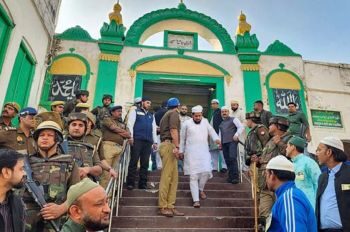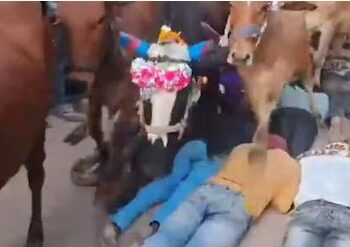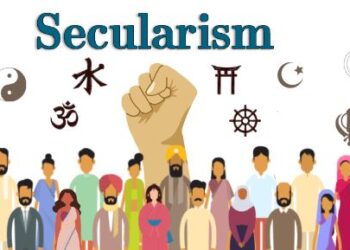The 155th birthday of Mahatma Gandhi was celebrated on 2nd October 2023. It was his wish to lead a long life of 120 years to serve the people, but his wish remained unfulfilled, owing to the tragic well planned assassination by communal and religious fanaticism.
The brahmin Godse coterie had tried twice to assassinate Gandhi. It succeeded at last in its third attempt. The country which got Independence from the British rule, shot Gandhi dead within a short period of six months since the celebration. Was the father of the nation against Hindu religion? Never ever! His views were as follows, in his own words.
“I claim to be a Sanatan Hindu, but I am against certain undesirable customs and conventions practised in the name of Hindu religion. I do believe in the Hindu dharma shastras, the Vedas, Upanishads, and mythological epics. Likewise, I believe in the divine avatars of gods and the rebirth of humans. I also believe in the Varnasrama that existed in the Vedic Age. The Varnasrama practised at present in a meaningless manner is not at all a Dharma.”
“When I refer to the Vedas, I never say that they were born of gods. That is because in my view, divinity does not rest in the Vedas alone. The holy Bible which is a code of conduct for the Christians, the holy Quran which is the code of conduct for the Muhammadans and the Jendavastha that is the code of conduct for the Parsis, also have the divinity equivalent to the Hindu Vedas.”
“Applying holy ash or religious signs on the forehead alone does not denote Hindu dharma. Chanting mantras accurately alone is not the principle of Hindu religion. Travelling far and wide on pilgrimages alone does not mean religious service. I would boldly say that all these cannot be called religious preachings. I am aware of all the atrocities taking place in most of the temples. And yet, I revere them so much that I am at a loss of words to describe it.”
“I am a social reformer too, but I shall never violate the basic tenets of Hindu dharma which are its roots of origin.” These were Gandhi’s resolute proclamations. The religion was in the beginning called Vedic religion and the Aryan religion. It was later named ‘Hindu’ by the others. Gandhi was on the way to a prayer meeting. when he was assassinated. Godse, who was trained by the RSS and who later quit it, joined hands with his co-believers and hatched a cruel plot to kill Gandhi. They did succeed in their wicked plan. Anyone would naturally be inclined to ask why Gandhi was killed. Today’s younger generation would also be curious enough to know the motive behind it.
Gandhi did not confine himself as a Hindu. In his discourses and prayer meets he used to make participants sing “Eashwar Allah Tere Naam”, with due concern to other religions too. People used to sing accordingly with an affinity towards all religions. The puzzling question that crops up in our minds is __ “Why and how were “Godses” generated inspite of the religious harmony preached by Gandhi?”
According to the miscalculation of the RSS, the religions supported by Gandhi were all alien religions. Besides, the good will and trust that Gandhi earned from the people posed a threat to the wicked coterie. Wearing a mask of religion, they were devising schemes to form a coalition rule of the upper caste dominant brahmins and the ‘banias’. They felt threatened that the love and respect of the people for Gandhi may become an obstacle in future for the achievement of that ulterior objective. This fear had obviously made the coterie hatch a plot to assassinate Gandhi. Gandhi’s staunch belief that religion should never be mixed with politics stood ignored. He insisted upon Indian Government ruling as a truly secular Government. This ideal principle also remained ignored.
During two visits of Gandhi to Tamil Nadu, brahmins complained of Communal G.O. alleging disparity to them in the rule of Omandur Ramasamy, who denied the allegations submitting statistical evidence. Gandhi was convinced by the explanations offered by Omandur Ramasamy. Gandhi asked those brahmins why they needed seats in medical and engineering colleges when their job was only to recite and chant the Vedas. He questioned them whether it was not against the Varnasrama. During his two visits to Tamil Nadu Gandhi realised the dire need of social justice everywhere.
Babasaheb Ambedkar strove endlessly for the rights of the servile classes. At the cost of his noble objective, he saved the life of Gandhi during the hunger strike. Had he not relaxed his rigidity at the time of arriving at Poona Pact, Gandhi might have passed away during his hunger strike. Ambedkar granted him a generous permit for a life span of 120 years as per his wish, but the wicked people ended his life when he was just 77. Their sole aim was to prevent Gandhi from becoming a hindrance to establishing a brahminical Hindu Rashtra regime in future, under the garb of religion.
The brahmins who once hailed Gandhi as ‘Mahatma’ were later threatened by his transformation and change of mind. They sensed imminent danger to their dominance. This fear caused the sketch for the inhuman assassination.
Thanthai Periyar had a talk in 1927 with Gandhi, when they met in Bangalore. It was a conversation with the great forethought of Periyar. He contravened Gandhi, condemning severely his belief of Varnasrama. Later, when Gandhi realised the Aryan atrocities and changed his mind, Periyar was greatly moved by his transformation. Immediately after the assassination Periyar appealed to the ruling authorities and the people to change the name of the country from ‘India’ to ‘Gandhi Desam’ and to rename the ‘Hindu religion’ as ‘Gandhi religion’.
Far-sighted Periyar smartly prevented chaotic disturbances in Tamil Nadu when Gandhi was assassinated. Many brahmins were attacked and assaulted in Maharashtra when the news of the assassination spread like wildfire. Periyar advised people in Tamil Nadu to hate only the brahminical policies – not brahmin individuals. He made the State a haven of peace by his wisdom.
We should all take a pledge to make India a land of peace and unity – free from hatred, caste and religion-based violence, inequality, and social injustice. The assassination of Gandhi must be an invaluable lesson for all of us forever. Let humanism and social justice flourish. During the 155th birth anniversary of Gandhi, let us all swear to achieve this objective.









